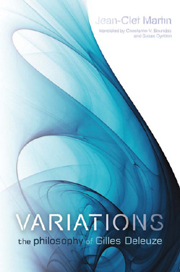Book contents
- Frontmatter
- Contents
- Letter-Preface by Gilles Deleuze
- Preambles
- First Variation: Ethics and Aesthetics
- Second Variation: Three Poetic Formulas for Nomadic Distribution
- Third Variation: Multiplicities
- Fourth Variation: Malcolm Lowry, or, the Manifesto of Things
- 1 The March Towards Death
- 2 Mannerisms
- 3 For a Microphysics of Qualities
- Postscript to the Anglo-American Edition: What is a Multiplicity?
- Notes
- Bibliography
- Index
2 - Mannerisms
from Fourth Variation: Malcolm Lowry, or, the Manifesto of Things
Published online by Cambridge University Press: 12 September 2012
- Frontmatter
- Contents
- Letter-Preface by Gilles Deleuze
- Preambles
- First Variation: Ethics and Aesthetics
- Second Variation: Three Poetic Formulas for Nomadic Distribution
- Third Variation: Multiplicities
- Fourth Variation: Malcolm Lowry, or, the Manifesto of Things
- 1 The March Towards Death
- 2 Mannerisms
- 3 For a Microphysics of Qualities
- Postscript to the Anglo-American Edition: What is a Multiplicity?
- Notes
- Bibliography
- Index
Summary
To render the unthought of thought thinkable, visible the invisible part of the visible, and sensible the insensible side of the sensible, is a way to jump past the riddles and to proceed through the doors of conception, perception and affection in the direction of the micrologic plane from where all these acts originate. Concepts, affects and percepts are actualized, thanks to a toss of the dice that produces a virtual coexistence of divergent series, and crosses the heterogeneous states of descriptive material – the best example of which is Simondon's crystal. This molecular, preindividual agitation allows for new circuits of visibility and new cerebral pathways that the ritornello reconnects piece by piece and step by step, in a semi-aleatory automatism. The latter goes beyond the cuts and micro-fissures – sometimes raw light, sometimes darkness, sometimes voids, sometimes little brain deaths – an entire reservoir of intermittences and divisions seized by the thread of the ritornello as it moves from one cut to another in accordance with an aleatory mechanism, and an uncertain system. We meet experiments of this nature wherever new procedures of creation are imposed – from Stendhal to Proust – as we pass over Nietzsche and Mallarmé. They mix complementary things together: porridge! molasses! chaos! All is there, on the same dishevelled plane – the invisible part of the visible. The problem is how to extract a new variety of colours from this chaos – note Van Gogh's athleticism! Malcolm Lowry attempts to strike a similar pose in a city-brain, where communications are lost and obstructions accelerate.
- Type
- Chapter
- Information
- VariationsThe Philosophy of Gilles Deleuze, pp. 191 - 204Publisher: Edinburgh University PressPrint publication year: 2010



